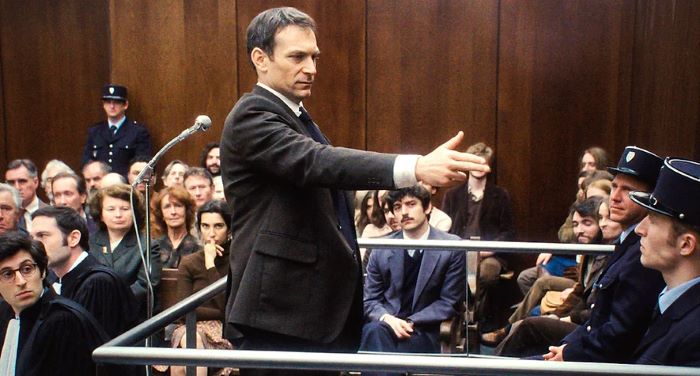In Cédric Kahn’s methodical but engrossing courtroom drama, we are asked to watch as a supremely unsympathetic character—Pierre Goldman (Arieh Worthalter), a far-left militant who has already been sentenced for armed robberies that he admitted to—returns to court to be retried. This time around, however, he resolutely refuses to admit he was involved in a robbery at a pharmacy in which two women died. He is already serving a life sentence after being convicted of the robberies and killings.
Based on a true story, Kahn’s film begins with Goldman’s lawyer’s preparation for the second trial in 1976, which has come about because of inconsistencies in the evidence as originally presented. Meanwhile, several left-wing celebrities (including Jean-Paul Sartre and Simone Signoret) have taken the defendant up as a cause célèbre.
Right from the beginning, Kahn highlights the unsettling contradictions in Goldman’s character as his lawyer Georges Kiejman (the formidable Arthur Harari, who won an Oscar cowriting another unusual courtroom drama, Justine Triet’s Anatomy of a Fall) reads a letter from Goldman in which his client says he wants to fire him because of his “armchair Jewishness” and political centrism. This is followed by a subsequent letter in which Goldman, who is also Jewish, says he is keeping him on.
It’s a good thing too because, as Kahn adroitly depicts, Kiejman is a dogged attorney who, when the film enters the courtroom, makes mincemeat of many of the prosecution witnesses who have fingered Goldman as the culprit, whether they are bystanders or police. Kiejman demolishes the so-called certainties of their memories, especially when one witness asserts that she has a “gut feeling” that she saw Goldman, despite admitting that she isn’t completely sure it was actually him. Kahn, who never tips his hand on whether he believes Goldman is guilty or innocent, dramatizes how Kiejman adroitly turns the trial into an indictment of revered French institutions, rife with corruption and selective justice.
To this American viewer, it’s eye-opening to find that, in a French courtroom, the defendant can defend himself with far more leeway than in the United States. Goldman angrily replies to what a judge or his lawyer or a witness says, often getting a rousing cheer from his many supporters in the chamber as he exasperates the magistrates and his own lawyer.
In one instance, after a typical Goldman outburst about racist police, Kiejman tries to finesse the situation by pointing out that his client didn’t mean to charge all police, just a few, yet his client steadfastly contradicts him with a simple declaration that “all police are racist.” Late in the trial, Goldman nearly derails his own defense with his prolonged harangue as he accuses his prosecutors of fascism and racism. It might play well with his ardent supporters but not with French jurisprudence.
Kahn directs intelligently, allowing the trial’s dialogue among the attorneys, judges, witnesses, and the defendant to have its own momentum. The screenplay by Kahn and Nathalie Hertzberg dispenses with exposition, aside from onscreen texts setting up the drama for the many of us uninitiated. There is, smartly, no musical score, which would only unnecessarily underline what is already present in the razor-sharp editing and sound design, as well as Patrick Ghiringhelli’s understated, somber cinematography.
The film was shot in the square Academy ratio, which gives it the vibe of an old TV movie or courtroom drama. At the same time, it makes Goldman, during the many glimpses of him in the defendant’s box, appear even more boxed in and constricted. That claustrophobia extends visually: The courtroom is the setting for nearly all of the running time.
Worthalter fiercely portrays how Goldman’s mercurial personality led him to this moment: A far-left radical who left France after refusing his military service, he visited first Cuba—where he met Castro—then Venezuela, where he joined in guerrilla preparations. He returned to France in 1969, when the robberies and killings occurred.
When Goldman’s estranged father Alter (a memorable cameo by the veteran Polish actor Jerzy Radziwi?owicz) takes the stand and is questioned about his son’s leftist politics and activities, Goldman yells out, “Who cares what he thinks?” Worthalter barks that line with a magnetic sneer that encapsulates the essence of Goldman’s mercurial character as simultaneously disturbing and fascinating.







Leave A Comment